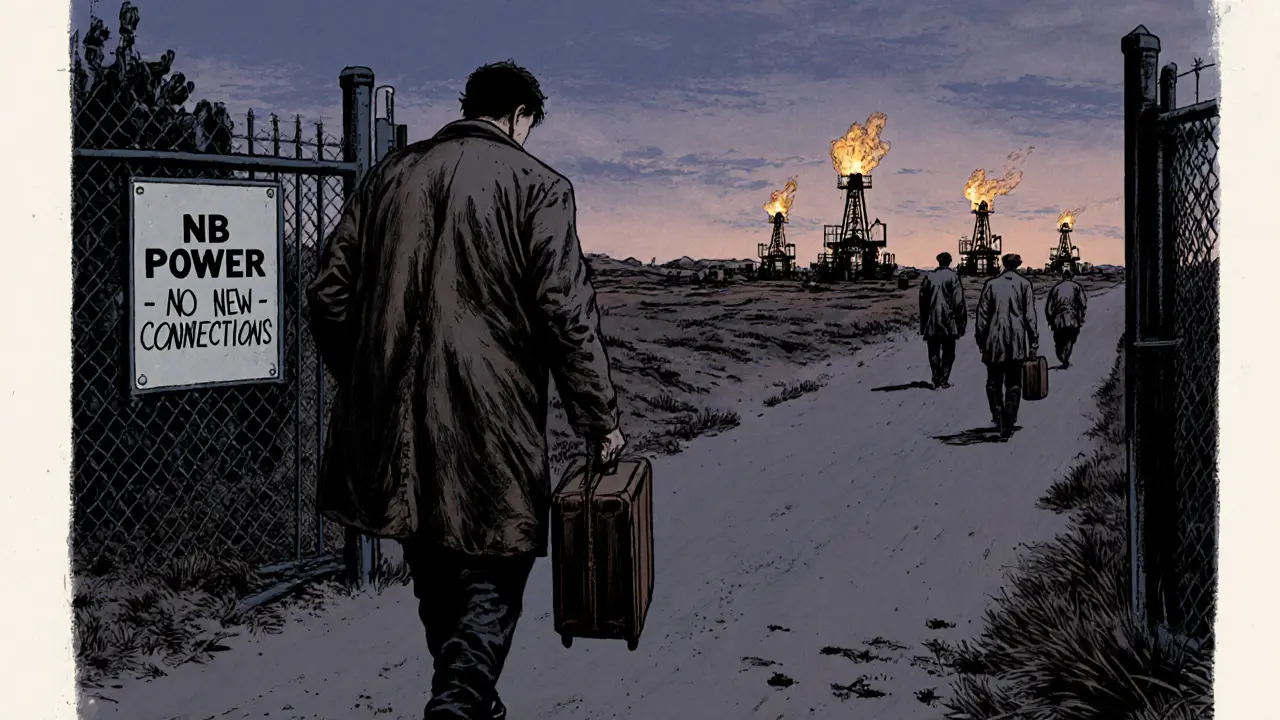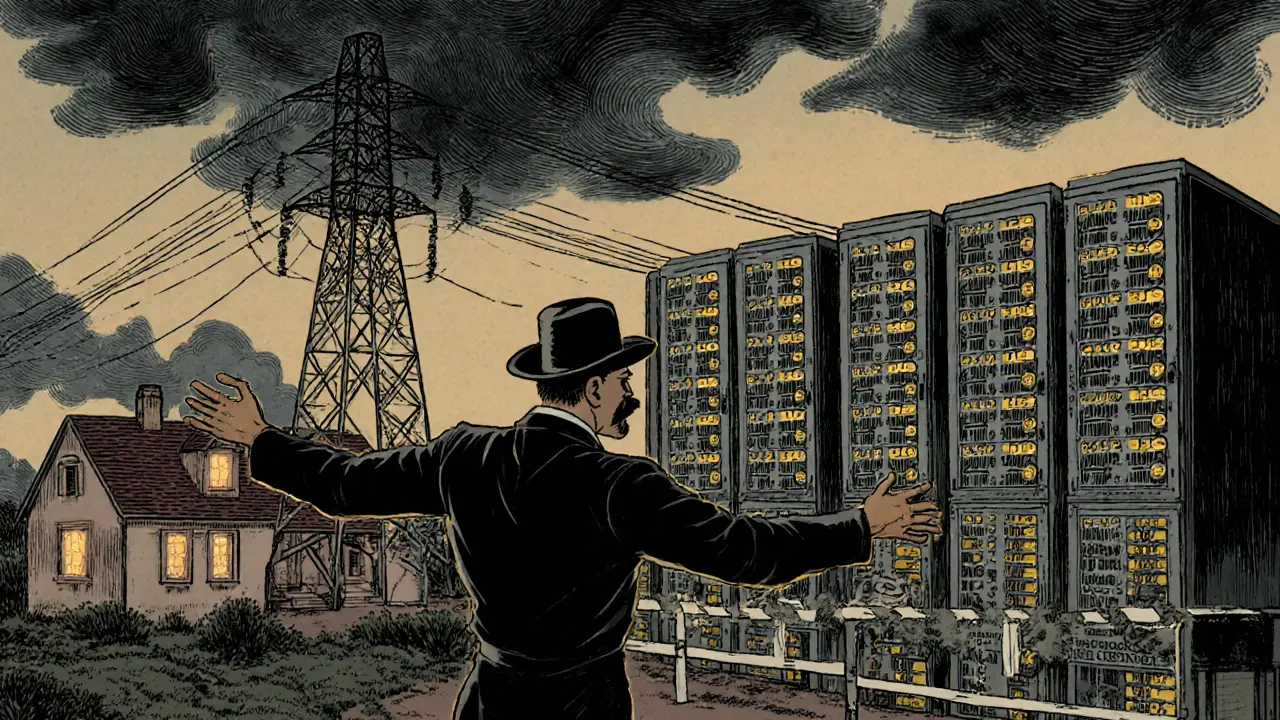Crypto Mining Energy Calculator
Energy Consumption Results
Total Energy (kWh/month):
0.00
Monthly Cost ($):
0.00
Equivalent Households:
0.00
When New Brunswick stopped new cryptocurrency mining operations from connecting to its power grid in 2023, it didn’t just make a policy change-it sent a clear message: the province won’t let Bitcoin mining eat up its electricity. This wasn’t a temporary pause. It wasn’t a delay. It was a full stop. And for anyone thinking about setting up a crypto mine in the province, the answer is simple: you can’t.
Why New Brunswick Hit the Pause Button
Back in March 2022, the provincial government told NB Power, the Crown-owned utility, to stop approving any new electricity connections for crypto mining. At the time, the move was framed as an indefinite hold. But by November 2023, that hold became a permanent ban. No new mines. No expansions. No exceptions. The reason? Electricity supply. New Brunswick’s grid isn’t infinite. And crypto mining-especially Bitcoin mining using Proof of Work-is one of the most power-hungry industries on the planet. A single large mining facility can use as much electricity as a small town. When you add up all the requests NB Power had received from miners, the total demand threatened to push the province’s entire grid past its limits. In Manitoba, a similar concern led to projections that crypto miners could soak up 4,600 megawatts of power-nearly 75% of the province’s total capacity at the time. New Brunswick didn’t need a full projection to see the danger. The writing was on the wall. If miners kept coming, everyday residents would face higher bills, blackouts, or both.What the Ban Actually Covers
This isn’t just about stopping new mines. It’s about freezing the entire sector in place. Existing crypto operations in New Brunswick can’t increase their power usage. If a mine was running on 5 megawatts in 2022, it’s stuck at 5 megawatts. No upgrades. No extra servers. No scaling up to chase more Bitcoin. The ban targets only large-scale, grid-connected mining. Small home rigs using a few hundred watts? Those aren’t affected. The rule is aimed squarely at industrial operations-warehouses full of ASIC miners, data centers humming 24/7, all plugged directly into NB Power’s transmission lines. NB Power doesn’t just say no. It actively blocks applications. Miners can’t even submit paperwork for a new connection. The utility has been ordered to refuse them outright. There’s no appeals process. No waiting list. No loopholes.How This Compares to Other Provinces
New Brunswick isn’t alone in cracking down, but it’s one of the strictest. Manitoba put a pause on new connections too, but theirs expires in April 2026. After that, they’ll reassess. British Columbia passed a law (Bill 24) to give BC Hydro legal power to cap crypto mining’s electricity use. They even won a court case against a company trying to force access to 2.5 million megawatt-hours a year. Hydro-Québec raised rates and capped usage-but still allows some mining to continue. Then there’s Alberta. The opposite of New Brunswick. With deregulated power markets and government support, Alberta became a magnet for crypto miners after China banned mining in 2021. Mines popped up in former oil fields, using cheap natural gas and surplus wind power. Miners moved there because they could. New Brunswick made sure they couldn’t move there anymore.
Why This Matters Beyond the Province
New Brunswick’s ban isn’t just a local issue. It’s part of a global shift. China shut down nearly all crypto mining in 2021, forcing operators to scatter. Many went to the U.S., Kazakhstan, and Canada. Now, those destinations are tightening up too. At least eight countries have outright banned mining. The world is realizing: Bitcoin mining isn’t just a tech trend. It’s an energy competitor. Every kilowatt-hour used to mine Bitcoin is a kilowatt-hour not used to heat homes, charge electric cars, or power hospitals. As climate goals push countries to electrify everything-from transportation to heating-governments are forced to choose. And increasingly, they’re choosing people over proof-of-work. New Brunswick’s move signals that even places with clean, renewable hydro power aren’t willing to sacrifice grid stability for mining. It’s not anti-technology. It’s pro-responsibility.What Happens to Miners Now?
If you’re a crypto miner who had plans for New Brunswick? You’re out of luck. There’s no legal path to connect. No backdoor. No secret negotiation. Some companies tried to disguise their operations as data centers or AI farms. NB Power is watching for that. Any facility using excessive power for non-essential computing is now under scrutiny. The province has made it clear: if it’s mining Bitcoin, it’s banned. The result? Miners are moving. Alberta is seeing more traffic. Texas and Georgia in the U.S. are also gaining new facilities. Even Iceland, with its geothermal power, is seeing renewed interest. But the easy wins-cheap hydro in Canada-are disappearing.
Will the Ban Ever Be Lifted?
No one knows. The government hasn’t said when-or if-it will revisit the ban. Unlike Manitoba’s timed pause, New Brunswick’s moratorium has no expiration date. That suggests officials see this as a long-term stance, not a short-term reaction. For the ban to change, something big would need to shift:- Significant upgrades to New Brunswick’s grid capacity
- A major drop in Bitcoin mining’s energy use (like a switch to Proof of Stake, which Bitcoin won’t adopt)
- A political change that prioritizes mining over consumer protection

Dick Lane
October 29, 2025 AT 08:31Been watching this play out for years and honestly I’m glad they drew the line
People act like electricity is infinite but it’s not
My grandma in rural Maine still gets outages in winter and we’re supposed to let miners take priority?
It’s not about hating tech-it’s about not letting greed rewrite the rules
Simple as that
Norman Woo
October 30, 2025 AT 09:26they say its about power but its really about control
they dont want miners because they know crypto will expose how broken the system is
the grid is fine they just dont want people to have real money
theyll say its for the people but next theyll ban cash too
watch
Serena Dean
October 31, 2025 AT 13:50Big win for everyday folks!
Every time a miner shows up, rates creep up and schools lose funding
New Brunswick didn’t just say no-they said ‘we choose families over servers’
And honestly? That’s leadership
Other provinces should copy this. No fluff. No excuses. Just common sense.
Also-small home rigs are still fine, so chill out, crypto bros 😊
James Young
November 2, 2025 AT 09:48You people are delusional if you think this is about ‘grid stability’
It’s about centralized control and fear of decentralized tech
Bitcoin mining uses less power than Google and Netflix combined and you’re banning it?
Meanwhile, your lazy politicians are still running diesel generators for their mansions
Pathetic. This isn’t protection-it’s cowardice dressed up as policy
Chloe Jobson
November 2, 2025 AT 10:15Energy allocation = public good prioritization
Proof of Work = non-essential load
Grid integrity > speculative compute
Hydro = finite resource
Residential > industrial mining
Policy aligns with climate goals
Legal clarity = market certainty
Miners migrated → Alberta/Texas
Net positive for consumers
Model for other jurisdictions
Andrew Morgan
November 3, 2025 AT 02:14Man I remember when we thought crypto was the future
Now it’s like watching a kid smash a piñata while everyone else is trying to eat dinner
They don’t get it
It’s not about hating Bitcoin
It’s about not letting one guy’s obsession turn your lights off at 8pm
And honestly? Good on New Brunswick
They didn’t yell
They just said no
And that’s more powerful than any law
Elliott Algarin
November 4, 2025 AT 04:09It’s funny how we treat energy like a commodity when it’s really a life support system
Bitcoin mining is just a very loud, very expensive way of asking ‘what’s the price of convenience?’
And the answer New Brunswick gave was: not yours
Not today
Not ever
Maybe we’re not ready for the future
Maybe we’re just finally learning how to say no to things that look like progress but aren’t
John Murphy
November 4, 2025 AT 05:55I wonder how many miners tried to sneak in as data centers
And how many got caught
I bet NB Power has a whole team just watching power spikes
It’s like watching a cat guard a fishbowl
They didn’t ban tech
They just stopped letting it eat the house
Smart move
Zach Crandall
November 5, 2025 AT 02:43It is imperative to note that the cessation of new cryptocurrency mining operations within the jurisdiction of New Brunswick constitutes a legally enforceable administrative directive issued by the provincial Crown corporation NB Power, pursuant to the Electricity Act, RSNB 2011, c E-10, and is not a mere policy guideline. This action is grounded in statutory obligations to ensure the reliability and integrity of the provincial power grid, as defined under Section 24(1)(a). Furthermore, the prohibition extends to any entity attempting to circumvent this restriction through reclassification as an AI or cloud computing facility, which constitutes a violation of subsection 17(3) of the Energy Conservation Act. The absence of an appeals mechanism is not an oversight but a deliberate feature of regulatory finality, consistent with precedent established in the 2022 case of R. v. Digital Mining Corp. (NBCA 2022).
It is therefore not open to interpretation.
Akinyemi Akindele Winner
November 6, 2025 AT 04:38They banned mining? LOL
They think they’re stopping the future?
Bitcoin don’t care about your grid or your hydro
It’s a digital dragon
And when the dragons wake up, they eat your power lines for breakfast
And then they laugh
And then they mine on solar panels you didn’t even know you had
Try banning the sun next
Try banning the wind
Try banning the moon
But you can’t ban math
And math don’t need your permission
Patrick De Leon
November 7, 2025 AT 20:53Canada’s only country that lets provinces decide to be weak
New Brunswick? Cute
They think they’re protecting people
They’re just protecting their own incompetence
Alberta’s got real energy policy
Real freedom
Real power
Meanwhile, you guys ban innovation because you’re scared of your own shadow
Pathetic
MANGESH NEEL
November 9, 2025 AT 06:49Of course they banned it
Because they know the truth
Bitcoin is the only thing that can break the chains of the globalist bankers
And they’re terrified
They don’t care about your lights
They care about you having no control
They’re using ‘grid stability’ as an excuse to crush freedom
They’ll ban your crypto wallet next
They’ll track your every purchase
They’ll turn your phone into a prison
And you’ll thank them for it
Because you’re too lazy to fight
And that’s why we’re all doomed
Sean Huang
November 11, 2025 AT 01:35Let me be clear: this is not about energy
This is about the establishment’s fear of a decentralized monetary system
Bitcoin is the only asset immune to central bank manipulation
And now they’re weaponizing infrastructure to suppress it
They call it a moratorium
But it’s a coup
They know if people can mine their own money
They’ll stop trusting the Fed
And if they stop trusting the Fed
They’ll stop trusting everything
And that’s why they had to act
They didn’t ban mining
They banned truth
And soon
They’ll ban thinking
Ali Korkor
November 12, 2025 AT 01:01Hey, if you’re a miner looking for a new home
Don’t panic
There’s still places
Alberta’s open
Texas is booming
Even Iceland’s got geothermal to spare
It’s not the end
It’s just a detour
And honestly? This might make you better
Stronger
More focused on efficiency
So keep going
You got this
madhu belavadi
November 14, 2025 AT 00:57they banned it
and now i feel so empty
i just wanted to mine
and now i have nothing
and the world keeps spinning
and i just want to cry
why did they do this
i just wanted to be part of something
why did they take it away
why